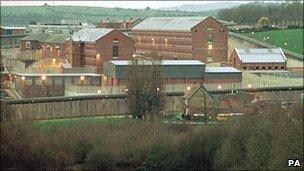Merged Isle of Wight prison criticised in report
- Published

Parkhurst Prison merged with Albany and Camp Hill jails to form HMP Isle of Wight in 2009
The merger of three prisons on the Isle of Wight has created an institution with "inherited weaknesses" including endemic drug use, a report has found.
An inspection of HMP Isle of Wight found "degrading" sanitation provision, high use of force and inmates seeking sanctuary in a segregation unit.
Inspectors found a quarter of prisoners were locked in their cells during the day in one section of the jail.
The prison was formed from the "clustering" of three jails in 2009.
The report showed some progress had been made since the merger of Parkhurst, Albany and Camp Hill prisons but the amalgamation had created a massive institution with a number of problems.
Night sanitation was said to be "unacceptable", staff resorted to "inappropriate" use of special accommodation, drug use was widespread and there was not enough education, training or work to keep prisoners purposefully occupied.
Inspectors who visited the jail last October found too many inmates were unemployed and not enough focus was placed on vocational qualifications.
Governor resigned
The report also said safety had deteriorated at Camp Hill - though it had improved at the other two sites, where steps had also been taken to reduce the disproportionate use of segregation.
Other areas praised included mental health services and suicide and self-harm prevention, which was said to be "generally well-managed".
The report also noted efforts by management to develop staff-prisoner relationships.
When the three prisons were combined into one category B jail, holding about 1,700 inmates, it was said the move would save more than £1m a year.
But the merger has been criticised in previous reports and the governor, Barry Greenberry, recently resigned.
Nick Hardwick, Chief Inspector of Prisons, said the prison was "in many ways, the sum of its three disparate parts" and acknowledged progress had been "inconsistent".
Juliet Lyon, director of the Prison Reform Trust, said the findings were "worrying" and reflected the "true cost of unchecked prison expansion".
She said: "Merging three separate prisons into one massive establishment has created a prison that, despite some improvements, is difficult to manage, unsafe in parts, with poor conditions in others and a lack of proper provision for education, training and work overall.
"These are lessons the government will need to consider carefully as it reviews its plans for the prison estate".
'Right direction'
But Michael Spurr, chief executive officer of the National Offender Management Service welcomed the improvements made following "a radical programme of change".
He said: "This report suggests the prison is heading in the right direction.
"The acting governor and his staff will continue to address the recommendations in the report and will build on the progress already being made."
In May last year, the prison had to replace its locks at a cost of £150,000 after a risk assessment showed there was a risk the locks could be "compromised".
A report from the Independent Monitoring Board into Albany Prison, published in May 2009, questioned the merger, saying: "The board feels the expense of the whole operation will not achieve the required financial result."
- Published18 June 2010